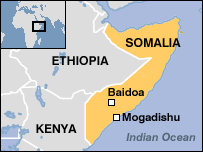Somalia’s interim president has strongly criticised the Islamic group which controls the capital, Mogadishu, ahead of possible peace talks.
BBC News
Wednesday, June 21, 2006
President Abdullahi Yusuf said the Islamists only seized the city because they were backed by thousands of extremists from around the world.
The Union of Islamic Courts denies harbouring al-Qaeda fighters.
Sudan is trying to organise talks this week, aimed at ending 15 years of anarchy in Somalia.
No Ethiopia deal
Mr Yusuf and other leaders of the interim government are discussing who should represent them in the talks at a meeting in the Kenyan capital, Nairobi.
Sudan’s President Omar al-Bashir, who is the current chairman of the Arab League, has offered to mediated between the two sides at talks in Khartoum.
Maj Felix Kulayigye Uganda defence spokesman |
A 10-member delegation from the Union of Islamic Courts has left Mogadishu for Sudan, led by deputy chairman Sheikh Husein Mohamud Jumaale.
President Yusuf insists that the Islamic courts should recognise his government before any discussions take place.
The US was widely believed to have backed an alliance of warlords, defeated by the Islamic courts in Mogadishu.
After meeting Ethiopia’s Prime Minister Meles Zenawi in Addis Ababa, Mr Yusuf denied accusations that Ethiopian troops were in the Somali town of Baidoa, where his government is based.
“We have not done any military agreement with the government of Ethiopia,” he said.
During the 1990s, Ethiopia backed Mr Yusuf in his fight against Somali Islamist groups.
Arms embargo
He also said that the Islamic courts were not supported by the majority of Somalis.
“They could not have overtaken Mogadishu if they did not have the backing of extremists from around the world,” he said.
 |
“The Islamists’ forces have an international reach and they have many collaborators from around the world… They are by the thousands.”
The Islamic courts have organised huge protests in Mogadishu against Mr Yusuf’s call for foreign peacekeepers in Somalia.
Both the United Nations and the African Union are sending teams to Somalia to meet the Islamic courts leaders and assess the possibility of sending peacekeepers, respectively.
Uganda has said it is ready to send troops but only when the security situation improves.
“Since the warlords have not yet agreed to a ceasefire, there is no peace to keep,” Uganda defence spokesman Maj Felix Kulayigye told the AP news agency.
The deployment of any peacekeepers would require the UN to lift its arms embargo on Somalia.
Source: BBC News, June 21, 2006






